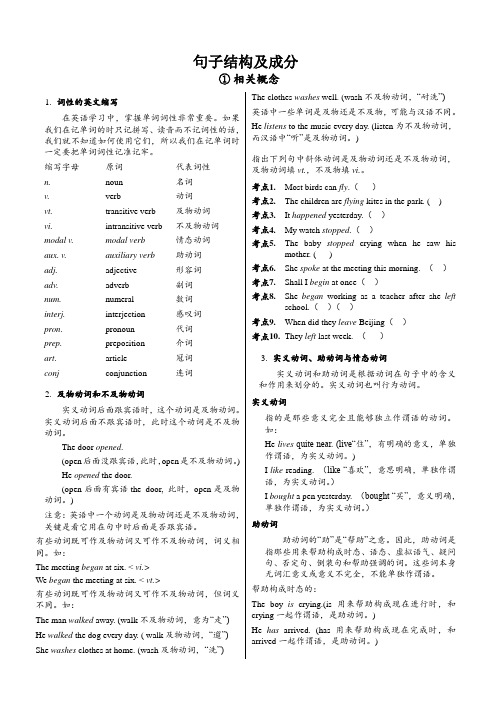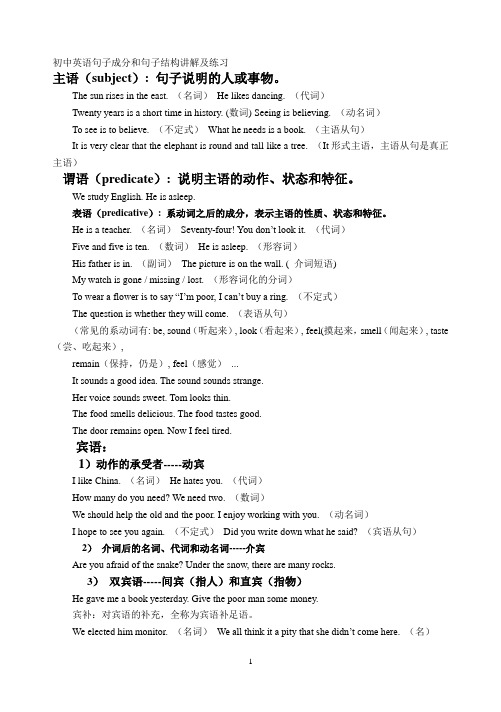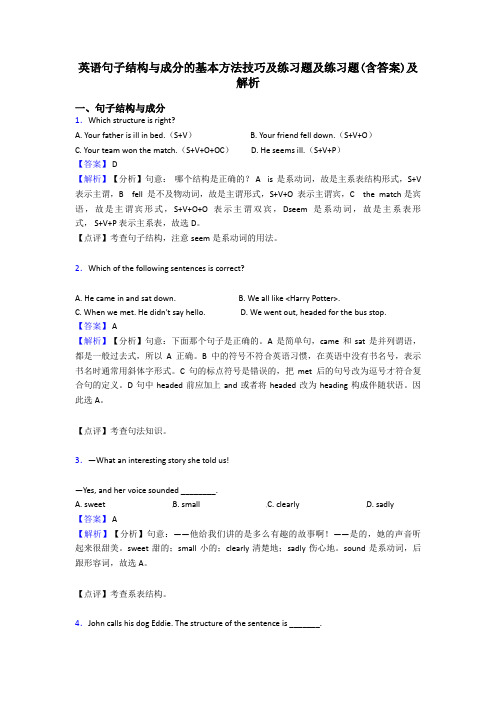英语句子成分和英语句子基本结构讲解及练习
五 英语句子成分和英语句子结构讲解及练习

1、简单句的五个基本句型❖主语+不及物动词She came..❖主语+及物动词+宾语She likes English.❖主语+系动词+主语补语She is happy.❖主语+动词+间接宾语+直接宾语She gave John a book.❖主语+动词+宾语+宾语补语She makes her mother angry.主谓宾❖名/代--动词--名/代we-- saw --you. we-- did --the work.主系表❖名/代-系动词-形容次/名词/代词you are beautiful you seems worried. 相同点:都三部分,主语也一样.不同点:否定式不同.动词加助动词,系动词不用.表语可以是形容词,宾语不行.只有宾语有补足语。
2、句子成分:英语句子成分分为七种:主语、谓语、宾语、定语、状语、表语、宾语补足语。
1)、主语是句子所要说的人或事物,回答是“谁”或者“什么”。
通常用名词或代词担任。
如:I’m Miss Green.(我是格林小姐)2)、谓语动词说明主语的动作或状态,回答“做(什么)”。
主要由动词担任。
如:Jack cleans the room every day. (杰克每天打扫房间)3)、表语在系动词之后,说明主语的身份或特征,回答是“什么”或者“怎么样”。
通常由名词、代词或形容词担任。
如:My name is Ping ping .(我的名字叫萍萍)4)、宾语表示及物动词的对象或结果,回答做的是“什么”。
通常由名词或代词担任。
如:He can spell the word.(他能拼这个词)❖有些及物动词带有两个宾语,一个指物,一个指人。
指物的叫直接宾语,指人的叫间接宾语。
间接宾语一般放在直接宾语的前面。
如:He wrote me a letter . (他给我写了一封信)❖有时可把介词to或for加在间接宾语前构成短语,放在直接宾语后面,来强调间接宾语。
英语句子的基本句型和成分(含例题及答案解析)

句子基本结构和成分1句子基本句型英语基本句型分为五种:主谓SV、主谓宾SVO、主系表SLP、主谓双宾SVOO、主谓宾宾补SVOC。
五种句型概述:句型主语谓语/系动词宾语/表语备注主谓SV Everybody laughed.主系表SLP She is a teacher.主谓宾SVO I love you.主谓双宾SVOO David asked me a question.其中‘me’和‘a question’两个宾语。
主谓宾宾补SVOC They painted the wall white.其中,white 为宾补修饰宾语the wall。
1.1主谓句型(Subject Predicate Verb-SV)1.1.1解析主谓句型与主谓宾句型最大的区别在于谓语动词的及物与不及物。
英语把及物动词叫做 transitive verb,不及物动词叫做intransitive verb.”transitive”在英语中是传递的意思,所以,如果动词表示的动作可以直接传递到某个事物,则称为及物动词,反之称为不及物动词。
及物动词与不及物动词又可以称为外动作词和内动作词。
外动作词是动作涉及或(达到)别的事物的动词,内动作词是动作凝于或止于主体本身的动词。
1.1.2基本结构:主语+不及物动词1.1.3主语可以作主语的成分有名词(如boy),主格代词(如you),数词,动词不定式,动名词等。
主语一般在句首。
注意名词单数形式常和冠词不分家。
1.1.4谓语谓语由动词构成,是英语时态、语态变化的主角,一般在主语之后,后接宾语。
但谓语可以是不及物动词(vi.),没有宾语,形成主谓结构。
1.1.5例句分析:(1)The sun is rising. 太阳正在升起。
(2)Tim is sleeping. 蒂姆正在睡觉。
(3)The train is arriving.火车要到站了。
(4)We waited and waited. 我们等了又等。
英语句子成分和英语句子结构讲解及练习

英语句子成分和英语句子结构讲解及练习英语句子就像一座建筑,句子成分是构成这座建筑的各种材料,而句子结构则是建筑的框架。
理解句子成分和结构对于我们正确理解和运用英语至关重要。
接下来,让我们一起深入探讨。
一、英语句子成分1、主语主语是句子所描述的主体,通常是某人、某事或某物。
它是句子的核心,决定了句子要说的是谁或什么。
比如,“The dog is cute” (这只狗很可爱。
)中,“The dog”就是主语。
2、谓语谓语表示主语的动作或状态。
它通常由动词构成。
例如,“She sings beautifully” (她唱歌很好听。
)中的“sings”就是谓语。
3、宾语宾语是动作的对象,通常是接受动作的人或物。
比如,“He bought a book” (他买了一本书。
)中的“a book”就是宾语。
4、表语表语用于说明主语的特征、状态、身份等。
常见的系动词有 be (am/is/are)、seem、look 等,其后的成分就是表语。
例如,“She is happy” (她很开心。
)中的“happy”就是表语。
5、定语定语用来修饰、限定名词或代词。
它可以是形容词、名词、代词、数词、介词短语等。
例如,“The red car is mine” (那辆红色的车是我的。
)中的“red”就是定语。
6、状语状语用于修饰动词、形容词、副词或整个句子,表示时间、地点、原因、方式、程度等。
比如,“He runs fast” (他跑得很快。
)中的“fast”就是状语。
7、补语补语用于补充说明宾语或主语的情况。
例如,“We made him our monitor” (我们选他当班长。
)中的“our monitor”就是宾语补足语。
二、英语句子结构1、简单句简单句只有一个主谓结构,是最基本的句子类型。
例如,“I love you” (我爱你。
)2、并列句并列句由两个或两个以上的简单句通过并列连词(and, but, or 等)连接而成。
英语句子成分和结构讲解分析划分与练习及答案

句子结构及成分①相关概念1.词性的英文缩写在英语学习中,掌握单词词性非常重要。
如果我们在记单词的时只记拼写、读音而不记词性的话,我们就不知道如何使用它们,所以我们在记单词时一定要把单词词性记准记牢。
缩写字母原词代表词性n. noun 名词v. verb 动词vt.transitive verb 及物动词vi.intransitive verb 不及物动词modal v. modal verb 情态动词aux. v. auxiliary verb 助动词adj.adjective 形容词adv.adverb 副词num. numeral 数词interj. interjection 感叹词pron. pronoun 代词prep.preposition 介词art. article 冠词conj conjunction 连词2.及物动词和不及物动词实义动词后面跟宾语时,这个动词是及物动词。
实义动词后面不跟宾语时,此时这个动词是不及物动词。
The door opened.(open后面没跟宾语,此时,open是不及物动词。
)He opened the door.(open后面有宾语the door, 此时,open是及物动词。
)注意:英语中一个动词是及物动词还是不及物动词,关键是看它用在句中时后面是否跟宾语。
有些动词既可作及物动词又可作不及物动词,词义相同。
如:The meeting began at six. < vi.>We began the meeting at six. < vt.>有些动词既可作及物动词又可作不及物动词,但词义不同。
如:The man walked away. (walk不及物动词,意为“走”)He walked the dog every day. ( walk及物动词,“遛”) She washes clothes at home. (wash及物动词,“洗”)The clothes washes well. (wash不及物动词,“耐洗”)英语中一些单词是及物还是不及物,可能与汉语不同。
初中英语句子成分和句子结构讲解及练习

初中英语句子成分和句子结构讲解及练习主语(subject): 句子说明的人或事物。
The sun rises in the east. (名词)He likes dancing. (代词)Twenty years is a short time in history. (数词) Seeing is believing. (动名词)To see is to believe. (不定式)What he needs is a book. (主语从句)It is very clear that the elephant is round and tall like a tree. (It形式主语,主语从句是真正主语)谓语(predicate): 说明主语的动作、状态和特征。
We study English. He is asleep.表语(predicative): 系动词之后的成分,表示主语的性质、状态和特征。
He is a teacher. (名词)Seventy-four! You don’t look it. (代词)Five and five is ten. (数词)He is asleep. (形容词)His father is in. (副词)The picture is on the wall. ( 介词短语)My watch is gone / missing / lost. (形容词化的分词)To wear a flower is to say “I’m poor, I can’t buy a ring. (不定式)The question is whether they will come. (表语从句)(常见的系动词有: be, sound(听起来), look(看起来), feel(摸起来,smell(闻起来), taste (尝、吃起来),remain(保持,仍是), feel(感觉)...It sounds a good idea. The sound sounds strange.Her voice sounds sweet. Tom looks thin.The food smells delicious. The food tastes good.The door remains open. Now I feel tired.宾语:1)动作的承受者-----动宾I like China. (名词)He hates you. (代词)How many do you need? We need two. (数词)We should help the old and the poor. I enjoy working with you. (动名词)I hope to see you again. (不定式)Did you write down what he said? (宾语从句)2)介词后的名词、代词和动名词-----介宾Are you afraid of the snake? Under the snow, there are many rocks.3)双宾语-----间宾(指人)和直宾(指物)He gave me a book yesterday. Give the poor man some money.宾补:对宾语的补充,全称为宾语补足语。
英语句子成分及其基本句型(含练习)

We like English very much. 我们非常喜欢英语。
Her uncle lives in Canada. 她叔叔住在加拿大。
She was lying in bed reading. 她躺在床上看书。
United we stand, divided we fall. 团结则存,分裂则亡。(from )
It’s an interesting story. 那是一个有趣的故事。
Do you have time to help us? 你有时间帮助我们吗?
Who is the woman being operated on? 正在动手术的女人是谁?
7. 状语:用于修饰动词、形容词、副词、短语或整个句子等,一般由副词、介词短语、非谓语动词短语或句子充当。用来修饰v., adj., adv., or 句子。 表示时间、地点、原因、目的、结果、程度、条件、方式和让步。
taste(尝、吃起来), remain(保持,仍是), feel(感觉) ….
It sounds a good idea.
The sound sounds strange.
Her voice sounds sweet.
连系动词有意义,不能独立作谓语,
须与表语在一起,常用look,become,be
助动词无意义,不能独立作谓语,
时态、疑问和否定,do,be,will最常用
情态动词must,can,may,表示语气和情态,
人称与数无变化,动词原形跟着它。
感官、使役动词:
一感二听三使四看
一感:feel二听:hear,listen三使:make, let ,have
英语句子结构与成分的基本方法技巧及练习题及练习题(含答案)及解析

英语句子结构与成分的基本方法技巧及练习题及练习题(含答案)及解析一、句子结构与成分1.Which structure is right?A. Your father is ill in bed.(S+V)B. Your friend fell down.(S+V+O)C. Your team won the match.(S+V+O+OC)D. He seems ill.(S+V+P)【答案】 D【解析】【分析】句意:哪个结构是正确的? A is 是系动词,故是主系表结构形式,S+V 表示主谓,B fell 是不及物动词,故是主谓形式,S+V+O 表示主谓宾,C the match是宾语,故是主谓宾形式,S+V+O+O表示主谓双宾,Dseem是系动词,故是主系表形式, S+V+P 表示主系表,故选D。
【点评】考查句子结构,注意seem是系动词的用法。
2.Which of the following sentences is correct?A. He came in and sat down.B. We all like <Harry Potter>.C. When we met. He didn't say hello.D. We went out, headed for the bus stop.【答案】 A【解析】【分析】句意:下面那个句子是正确的。
A是简单句,came和sat是并列谓语,都是一般过去式,所以A正确。
B中的符号不符合英语习惯,在英语中没有书名号,表示书名时通常用斜体字形式。
C句的标点符号是错误的,把met后的句号改为逗号才符合复合句的定义。
D句中headed前应加上and或者将headed改为heading构成伴随状语。
因此选A。
【点评】考查句法知识。
3.—What an interesting story she told us!—Yes, and her voice sounded ________.A. sweetB. smallC. clearlyD. sadly【答案】 A【解析】【分析】句意:——他给我们讲的是多么有趣的故事啊!——是的,她的声音听起来很甜美。
十大词性-句子成分及基本句型讲解及练习(附答案)

十大词性、句子成分分析、五大基本句型及句子类型讲解与练习一、新课导入个体名词集体名词普通名词 物质名词1.名词 抽象名词专有名词功能:表示人或事物的名称人称代词: 主格 宾格 〔注意it 的用法〕物主代词: 形容词性物主代词 名词性物主代词指示代词:this, that, these, those单数:myself`, yourself, himself, herself, itself, oneself反身代词:复数:ourselves, yourselves, themselves2.代词疑问代词:who, whom, whose, what, which.简单不定代词:One/ones, Either/neither, both/all, each/ everyanother, other, the other, others, the others复合不定代词: somebody, anybody, nobody不定代词 someone, anyone, no onesomething, anything, nothingeverybody, everyone, everything功能:用来代替名词、形容词或数词等3.数词: 基数词 序数词 功能:表数量或顺序4.冠词: 定冠词 不定冠词 零冠词 //功能:用在名词前,帮助说明名词所指的人或事物表地点:at/ in/ on/ to, above/ over/ on, below/ under/ underneath ….表时间: in/ on/ at, in/ after, from/since from, after/ behind,5.介词: 表运动: across/ through/ over/ pass …表方位:….其他功能:用在名词、代词等前面,说明句子中词与词之间的关系6.形容词:平级、比较级、最高级功能:用来修饰名词,表示人或事物的特性、性质7. 副词:平级、比较级、最高级功能:用来修饰动词、形容词或其他副词,表示动作或形状的特性并列连词:and/ both/ or/ not only…but also, but/however/ yet/ still/ while…8. 连词:从属连词: if/ unless, because/as/ since, although/though…功能:用来连接词、短语或句子实义动词〔vi./vt.〕系动词助动词9. 动词:情态动词不定式〔to do〕非谓语动词分词: 现在分词〔-ing〕和过去分词〔-ed〕动名词〔-ing〕功能:表示人或事物的动作或状态10. 感慨词:oh ah well…功能:表示说话时的感情或口气课前小测:1.句子成分摸底测试:(1)指出以下句子划线部分是句子的什么成分?1)The students got on the school bus.2)He handed me the newspaper.3)I shall answer your questions after class.4)What a beautiful Chinese painting!5)They went hunting together early in the morning.(2)判断以下句子是简单句并列句还是复合句?1)We often study Chinese history on Friday afternoon.2)The boy who offered me his seat is called Tom.3)There is a chair in this room, isn’t there?4)My brother and I go to school at half past seven in the morning.5)He is in Class One and I am in Class Two.二:新课讲解:〔一〕句子成分七种句子成分:主语、谓语、宾语〔直接宾语、间接宾语〕、定语、状语、补语、表语等。
- 1、下载文档前请自行甄别文档内容的完整性,平台不提供额外的编辑、内容补充、找答案等附加服务。
- 2、"仅部分预览"的文档,不可在线预览部分如存在完整性等问题,可反馈申请退款(可完整预览的文档不适用该条件!)。
- 3、如文档侵犯您的权益,请联系客服反馈,我们会尽快为您处理(人工客服工作时间:9:00-18:30)。
英语句子成分和英语句子基本结构讲解及练习一、句子的基本结构(5种)1、主语+谓语(s+v)2、主语+系动词+表语(s+l+p)3、主语+谓语+宾语(s+v+o)4、主语+谓语+间接宾语(指人)+直接宾语(指物)(s+v+io+do)5、主语+谓语+宾语+宾语补足语(s+v+o+c)二、句子成分:(主语、谓语、表语、宾语、定语、状语、宾补、同位语、插足语)1. 主语(subject):句子说明的人或事物。
The sun rises in the east () He likes dancing. ()Twenty years is a short time in history. ( ) Seeing is believing. ()To see is to believe.() What he needs is a book.()It is very clear that the elephant is round and tall like a tree.()(一)指出下列句中主语的中心词① The teacher with two of his students is walking into the classroom.② There is an old man coming here.③ The useful dictionary was given by my mother last year.④ To do today's homework without the teacher's help is very difficu lt.2. 谓语(predicate):是对主语加以陈述,表示主语的行为或状态,常用动词或者动词词组担任,放在主语的后面。
We study English. He is asleep. (二). 选出句中谓语的中心词① I don't like the picture on the wall. A. don't B. like C. pictureD. wall② The days get longer and longer when summer comes. A. get C. days D. summer③ Do you usually go to school by bus? A. Do B. usually C. go D. bus④ There will be a meeting at the library this afternoon.A. will beB. meetingC. the libraryD. afternoon⑤ Did the twins have porridge for their breakfast? A. Did B. twins C. have D. breakfast3. 表语(predicative):系动词之后的成分,表示主语的性质、状态和特征。
He is a teacher. () Seventy-four! You don’t look it. ()Five and five is ten. () He is asleep. ()His father is in.() The picture is on the wall. ( )My watch is gone / missing / lost. ()The question is whether they will come. ()(常见的系动词有: be, sound(听起来), look(看起来), feel(摸起来,smell(闻起来), taste(尝、吃起来), remain(保持,仍是), feel(感觉)……It sounds a good idea. The sound sounds strange.Her voice sounds sweet. Tom looks thin.The food smells delicious. The food tastes good.The door remains open. Now I feel tired.(三) 挑出下列句中的表语① The old man was feeling very tired.② Why is he worried about Jim?③ The leaves have turned yellow.④ Soon They all became interested in the subject.⑤ She was the first to learn about it.4. 宾语:1)动宾表示行为的对象,常由名词或者代词担任。
放在及物动词或者介词之后。
如:I like China. () He hates you. ()How many do you need? We need two. () I enjoy working with you. ()I hope to see you again. () Did you write down what he said? ()2)介词后的名词、代词和动名词-----介宾Are you afraid of the snake? Under the snow, there are many rocks.3)双宾语-----间宾(指人)和直宾(指物)He gave me a book yesterday . Give the poor man some money.(四) 挑出下列句中的宾语① My brother hasn't done his homework.② People all over the world speak English.③ You must pay good attention to your pronunciation.④ How many new words did you learn last class?⑤ Some of the students in the school want to go swimming, how about you?5. 宾补:对宾语的补充,全称为宾语补足语。
We elected him monitor. () We all think it a pity that she didn’t come here. ()We will make them happy. () We found nobody in. ( )Please make yourself at home. ()Don’t let him do that. ()His father advised him to teach the lazy boy a lesson. ()Don’t keep the lights burning. ()I’ll have my bike repaired. ()(五) 挑出下列句中的宾语补足语① She likes the children to read newspapers and books in the reading-room.② He asked her to take the boy out of school.③ She found it difficult to do the work.④ They call me Lily sometimes.⑤ I saw Mr. Wang get on the bus.⑥ Did you see Li Ming playing football on the playground just now?6. 定语:修饰或限制名词或代词的词、词组或句子。
Ai Yanling is a chemistry teacher.() He is our friend. ()We belong to the third world.() He was advised to teach the lazy boy a lesson.()The man over there is my old friend.( )The woman with a baby in her arms is my sister. ( )The boys playing football are in Class 2. ()The trees planted last year are growing well now. ()I have an idea to do it well.() You should do everything that I do. ()(六) 挑出下列句中的定语① They use Mr., Mrs. with the family name.② What is your given name?③ On the third lap are Clas s 1 and Class 3.④ I am afraid some people forgot to sweep the floor.⑤ The man downstairs was trying to sleep.7. 状语:用来修饰v., adj., adv., or 句子。
表示时间、地点、原因、目的、结果、程度、条件、方式和让步。
(以下例句按上述顺序排列)I will go there tomorrow. The meeting will be held in the meeting room.The meat went bad because of the hot weather. He studies hard to learn English well.He didn’t study hard so that he failed in the exam. I like some of you very much.If you study hard, you will pass the exam. He goes to school by bike.Though he is young, he can do it well.(七) 挑出下列句中的状语① There was a big smile on her face.② Every night he heard the noise upstairs.③ He began to learn English when he was eleven.④ The man on the motorbike was travelling too fast.⑤ With the medicine box under her arm, Miss Li hurried off.(八) 划出句中的直接宾语和间接宾语① Please tell us a story.② My father bought a new bike for me last week.③ Mr. Li is going to teach us history next term.④ Here is a pen. Give it to Tom.⑤ Did he leave any message for me?。
